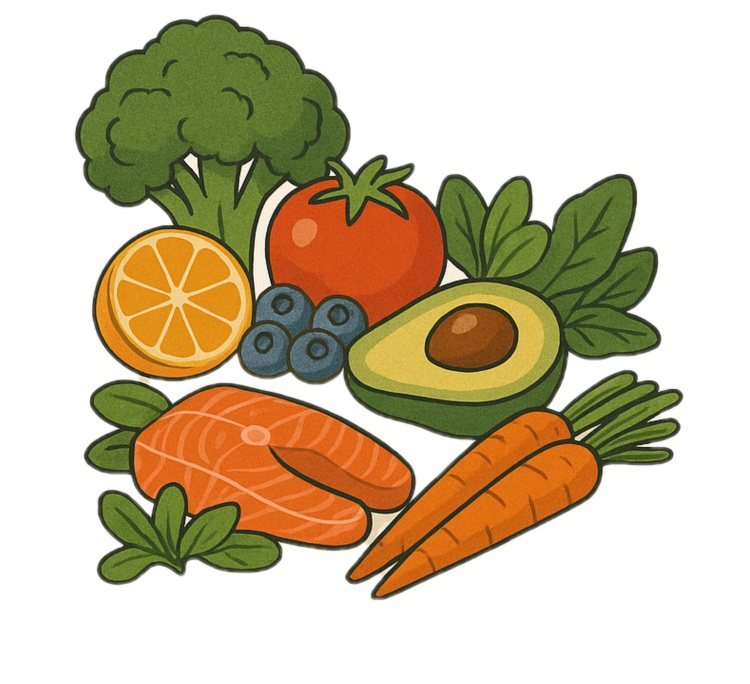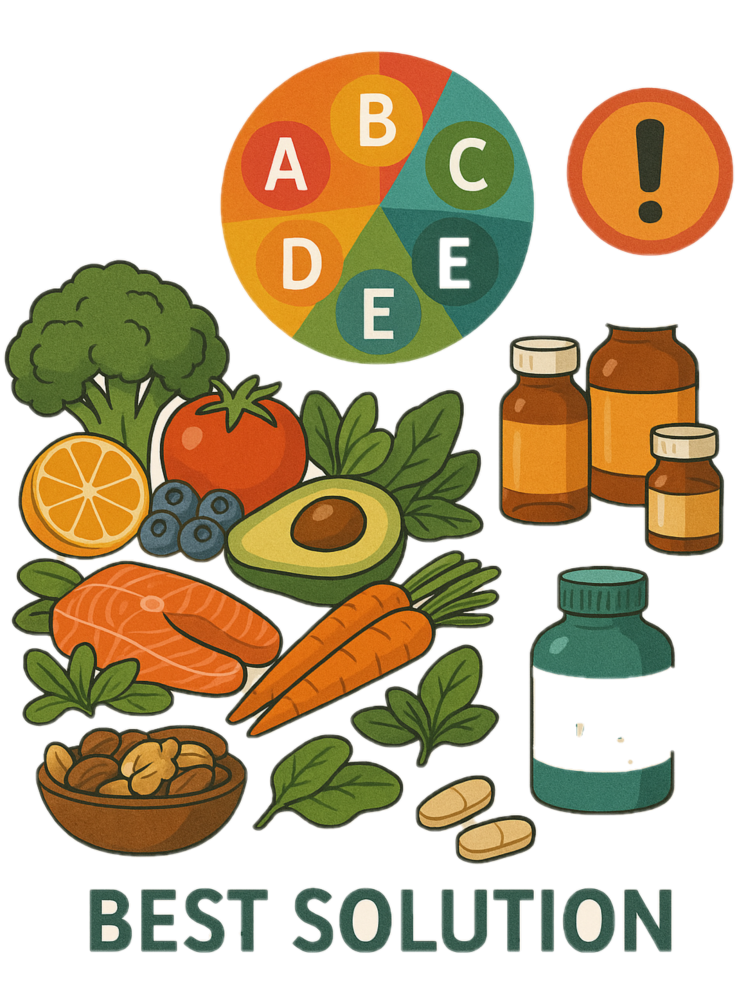
Vitamins are essential micronutrients that play a crucial role in maintaining overall health. They support various bodily functions, from strengthening the immune system to improving skin health and boosting energy levels. However, while vitamins are vital, excessive intake can lead to harmful effects. Understanding the right balance, natural sources, and traditional solutions can help optimize health safely and effectively.
Essential Vitamins and Their Effectiveness
1. Vitamin A
Effectiveness: Supports vision, immune health, and cell growth.
Excessive Intake Risks: Too much vitamin A can lead to toxicity, causing dizziness, nausea, liver damage, and even birth defects in pregnant women.
Best Sources: Carrots, sweet potatoes, liver, and leafy greens.
2. Vitamin B Complex (B1, B2, B3, B5, B6, B7, B9, B12)
Effectiveness: Vital for energy production, brain function, and red blood cell formation.
Excessive Intake Risks: Overuse can cause nerve damage (B6), liver issues (B3 in high doses), or an imbalance in other B vitamins.
Best Sources: Whole grains, eggs, dairy, nuts, and leafy greens.
3. Vitamin C
Effectiveness: Strengthens the immune system, enhances iron absorption, and promotes skin health.
Excessive Intake Risks: High doses may lead to kidney stones, diarrhea, and stomach cramps.
Best Sources: Citrus fruits, strawberries, bell peppers, and kiwi.
4. Vitamin D
Effectiveness: Supports bone health, calcium absorption, and immune function.
Excessive Intake Risks: Overconsumption can cause calcium buildup in the blood (hypercalcemia), leading to kidney damage.
Best Sources: Sunlight, fatty fish, fortified dairy products, and mushrooms.
5. Vitamin E
Effectiveness: Acts as an antioxidant, protecting cells from damage and supporting skin health.
Excessive Intake Risks: High doses can increase the risk of bleeding problems and stroke.
Best Sources: Nuts, seeds, spinach, and vegetable oils.
6. Vitamin K
Effectiveness: Essential for blood clotting and bone health.
Excessive Intake Risks: Can interfere with blood-thinning medications.
Best Sources: Kale, broccoli, spinach, and soybeans.
The Best Solutions: Traditional vs. Natural
Traditional Solutions (Supplements and Fortified Foods)
Multivitamins provide a convenient way to meet daily nutritional needs.
Fortified foods, like cereals and dairy, help individuals with dietary restrictions.
However, synthetic supplements can sometimes lead to excessive intake and imbalances.
Natural Solutions (Whole Foods and Herbal Remedies)
Consuming a balanced diet rich in fruits, vegetables, lean proteins, and whole grains ensures adequate vitamin intake.
Herbs like spirulina (rich in B vitamins) and turmeric (antioxidant properties) offer natural alternatives to supplements.
Sun exposure remains the best natural source of vitamin D.
Excessive intake of vitamins can lead to toxicity and adverse health effects. Here’s how overconsumption of different vitamins can harm the body

Fat-Soluble Vitamins (Stored in the body, higher risk of toxicity)
-
Vitamin A (Retinol) Toxicity
-
Effects: Nausea, dizziness, liver damage, bone thinning, birth defects in pregnant women.
-
Cause: Overuse of supplements or excessive consumption of liver.
-
-
Vitamin D Toxicity
-
Effects: High calcium levels (hypercalcemia), kidney damage, nausea, confusion, and heart issues.
-
Cause: Excessive supplement use rather than dietary sources.
-
-
Vitamin E Toxicity
-
Effects: Increased risk of bleeding, weakened immune response, and potential hemorrhagic stroke.
-
Cause: High-dose supplements.
-
-
Vitamin K Toxicity
-
Effects: Can interfere with blood-thinning medications, leading to clotting issues.
-
Cause: Excess supplementation, especially synthetic forms.
-
Water-Soluble Vitamins (Less risk as excess is excreted, but still harmful in high doses)
-
Vitamin C Toxicity
-
Effects: Stomach pain, diarrhea, kidney stones, and increased iron absorption leading to toxicity.
-
Cause: Mega-doses from supplements.
-
-
Vitamin B6 (Pyridoxine) Toxicity
-
Effects: Nerve damage, numbness, and difficulty walking.
-
Cause: Long-term high doses of supplements.
-
-
Vitamin B3 (Niacin) Toxicity
-
Effects: Liver damage, high blood sugar, skin flushing, and stomach irritation.
-
Cause: High-dose supplements used for cholesterol management.
-
-
Folate (Vitamin B9) Toxicity
-
Effects: Masks vitamin B12 deficiency, leading to nerve damage.
-
Cause: Overuse of supplements, especially in fortified foods.
-
Best Approach to Avoid Vitamin Toxicity
-
Get nutrients from whole foods rather than relying heavily on supplements.
-
Follow recommended daily intake (RDI) and consult a healthcare professional before taking high-dose vitamins.
-
Be cautious with fat-soluble vitamins, as they accumulate in the body more easily.
Final Thoughts
Vitamins are indispensable for a healthy life, but moderation is key. The best approach is a combination of natural dietary sources and traditional supplementation when necessary. Striking the right balance will help maximize benefits while avoiding potential harm. Moderation is key—vitamins are beneficial in the right amounts but harmful in excess.
What are your preferred ways to get essential vitamins? Share your thoughts in the comments!